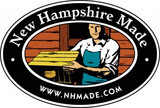Aside from the Pure Tallow Soap, Pumice Tallow Soap, Pine Tar Soap, and the Unscented Tallow Balm, all of our soaps and balms include natural essential oils made from plant extract. We use essential oils in our soaps for their scent and their potential health benefits. When choosing the right soap, you have to figure out which essential oils work for you and why. To make it a little easier, we have compiled all of the essential oils we use and some of their benefits. If you want to know more about a specific essential oil, we recommend doing some individual research to confirm which one is right for you.
Cedarwood - Cedarwood essential oil is derived from the needles, leaves, bark, and berries of cedar trees. It is known for its soothing, relaxing, and comforting properties. Cedarwood essential oil is commonly used for sleep, anxiety, aromatherapy, and in colognes. It is also great for oily and acne-prone skin because it helps alleviate and reduce stubborn breakouts. Cedarwood oil may also be beneficial for other skin conditions. For example, it may reduce the appearance of scars, treat minor wounds, alleviate arthritis pain, and soothe symptoms of eczema.
Coffee – Coffee essential oil is derived through a cold-pressed distillation process of coffee beans. It acts as a vasoconstrictor and is rich in antioxidants and phytosterols. This means it protects your skin from free radicals, helps your skin retain moisture, and reduces inflammation. It is known in the skincare world for its skin tightening and cellulite-reducing potential.
Eucalyptus - Eucalyptus essential oil is made with eucalyptus leaves that are dried, crushed, and distilled. Eucalyptus essential oil is known to relieve respiratory based ailments and muscle pain and soreness. It also has properties that strengthen your immune system, act as an antiseptic, and stimulate brain activity. It is an excellent bug repellent and DEET alternative for those who cannot use DEET.
Peppermint – Peppermint essential oil is made by extracting oil from the leaves of the peppermint plant. Peppermint essential oil has been used medicinally for centuries and dates back to the ancient Egyptians. Peppermint oil has a wide variety of uses, but its most common properties are itch relief, muscle pain, and headache relief. Peppermint oil also has a cool, sharp scent that can be refreshing and awakening.
Lavender – Lavender essential oil is derived from the lavender plant, and it is commonly known for its calming and soothing properties. As a natural antidepressant and detoxifier, lavender essential oil is typically used for aromatherapy and stress relief. Lavender essential oil is also said to have antibiotic and antiseptic properties that can help promote healing and prevent scarring. It is a great soap ingredient with healing properties that leave skin feeling smooth, silky, and moisturized.
Tea Tree – Tea tree oil comes from the evergreen leaves of the Australian Melaleuca Alternifolia tree. It is a very fragrant oil that is known for its antiviral, antibacterial, and antifungal properties. Tea tree oil can be used to soothe skin, hair, and nail conditions and as an insect repellent. When used topically, tea tree oil can aid certain skin conditions or improve the skin's overall appearance.
Lemongrass – Lemongrass essential oil is extracted from the leaves and stalks of the lemongrass plant. It has a bright citrus scent that can help with symptoms of stress, anxiety, and depression. Lemongrass essential oil is also known to have anti-inflammatory, antifungal, antibacterial, and antioxidant properties. It can help with infections, arthritis, fungi, and free radical damage.
Orange – Orange essential oil is extracted from the rind of the sweet orange, Citrus sinensis. Much like lemongrass essential oil, orange has a bright citrus scent that can improve your mood and combat symptoms of anxiety and depression. It can also be used to reduce pain and inflammation in some cases.
Clove – Clove essential oil is derived from clove trees known as Syzygium aromaticum. It is native to Southeast Asia, although today, you may find it growing in other locations, too. It has antiseptic, antiviral, and antifungal properties that can help kill bacteria and fungi and ease pain. Clove oil has also been found to aid in severe itching.
Patchouli - Patchouli essential oil is derived from the leaves of the patchouli plant. The leaves and stems of the plant are harvested and allowed to dry out before the distillation process to extract the oil. Patchouli has a calming, earthy scent, and it can be used as an insecticide, antifungal, and antibacterial. Patchouli essential oil can help relieve anxiety and depression, and it can soothe skin conditions such as acne, eczema, and dry skin.
Rosemary – Rosemary essential oil is extracted from the needle-like leaves of the rosemary evergreen shrub. It has been known to help increase memory and brain function and can help relieve stress. It is also ideal for removing other strong scents from cooking or working. Rosemary essential oil has anti-inflammatory, insecticide, and antibacterial properties. It can help improve circulation and healing.
Pine Tar – Even though pine tar is not an essential oil, we feel it’s important to list its benefits. The pine tar we use is derived from pine tree stumps and burned in a kiln resulting in "genuine peasant made tar." This pure form of pine tar is known for its antifungal, anti-inflammatory, and antibacterial properties. It is excellent for relief from long and short-term skin conditions like dry skin, eczema, and psoriasis.
This list is not all-encompassing, and we hope to continue to try new essential oils in the future. If you’re looking for a fresh new soap this summer, we recommend our Lemongrass Tallow Soap or our Eucalyptus and Peppermint Tallow Soap. Both of these soaps are the perfect summer fresh vibe. Check out one of those, or use this list to find the perfect soap for you.





